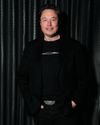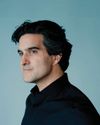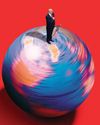
SUNDAR PICHAI, CEO of Alphabet, parent company of Google, stands onstage in front of a packed house at the Shoreline Amphitheatre in Mountain View, Calif. He's doing his best interpretation of a role pioneered by Steve Jobs and Bill Gates: the tech CEO as part pop idol, part tentrevival preacher, deliverer of divine revelation, not in song or sermon but in software and silicon. Except the soft-spoken, introverted Pichai is not a natural for the role: Somehow his vibe is more high school musical than Hollywood Bowl.
Pichai declared Google to be an "A.I.-first" company way back in 2016. Now A.I. is having a major moment but a Google rival is grabbing all the attention. The November debut of ChatGPT caught Google off guard, setting off a frantic six months in which it scrambled to match the generative A.I. offerings being rolled out by ChatGPT creator OpenAI and its partner and backer, Microsoft.
Here, at the company's huge annual I/O developer conference in May, Pichai wants to show off what Google built in those six months. He reveals a new Gmail feature called Help Me Write, which automatically drafts whole emails based on a text prompt; an A.I.-powered immersive view in Google Maps that builds a realistic 3D preview of a user's route; generative A.I. photo editing tools; and much more. He talks about the powerful PaLM 2 large language model (LLM) that underpins much of this technology-including Bard, Google's ChatGPT competitor. And he mentions a powerful family of A.I. models under development, called Gemini, that could immensely expand A.I's impact and its risks.
This story is from the {{IssueName}} edition of {{MagazineName}}.
Start your 7-day Magzter GOLD free trial to access thousands of curated premium stories, and 9,000+ magazines and newspapers.
Already a subscriber ? Sign In
This story is from the {{IssueName}} edition of {{MagazineName}}.
Start your 7-day Magzter GOLD free trial to access thousands of curated premium stories, and 9,000+ magazines and newspapers.
Already a subscriber? Sign In

THE NEW GOLD RUSH
Gold prices have soared amid global uncertainty and a central-bank-driven buying spree. But this time, the gold mining industry looks very different.

A New Season for Giving
As the PGA TOUR kicks off its 2025 season alongside its sponsors in Hawai'i, the organization is continuing to make an impact in local communities.

WELCOME TO ELONTOWN, USA
The small town of Bastrop, Texas (pop. 12,000), has become a home base for Elon Musk's business empire. What comes next is anyone's guess.

100 MOST POWERFUL PEOPLE
Our inaugural, authoritative ranking of the leaders whose innovation and impact have elevated them to the top of the business world.

ARE CEO SABBATICALS THE ULTIMATE POWER MOVE?
WHEN VENTURE capitalist Jeremy Liew and his wife were dating, they talked about how one day they would take a year to travel the world. \"That's how we'd know we'd made it,\" Liew says.

WHAT ARE THE BEST METRICS FOR MEASURING A STARTUP'S POTENTIAL?
IN HIS 2012 ESSAY \"Startup = Growth,\" Paul Graham talks about a 5% to 7% weekly growth rate as table stakes for startup success. If you're growing 10%, he says, you're doing \"exceptionally well.\"

TECH POLYMARKET'S ELECTION ACCURACY MADE SHAYNE COPLAN A STAR-BUT AN FBI RAID POINTS TO TROUBLE AHEAD
IN NOVEMBER, Shayne Coplan had a week he'll remember for the rest of his life: He got a phone call from the highest echelons at Mar-a-Lago. He went on TV for the first time. And his New York City apartment was raided by the FBI.

WHY BIG TECH IS THE NUCLEAR INDUSTRY'S NEW BEST FRIEND
OVER THE PAST several years, Big Tech firms like Google and Microsoft have trumpeted ambitious plans to go carbon-neutral, or even carbon-negative, by 2030. But then the generative-AI boom came along and threw a giant wrench in their plans.

WHAT PALMER LUCKEY, THE MAN REVOLUTIONIZING WARFARE, IS AFRAID OF
PALMER LUCKEY, the founder of the $14 billion Al-powered weapons startup Anduril, has become the face of change in the defense industry.

GLOBAL BUSINESS BRACES FOR TRUMP 2.0
AROUND THE WORLD in 2024, voters chose change: in South Africa, France, Britain, and Japan. But nowhere does the anti-incumbent trend matter more than in the United States.